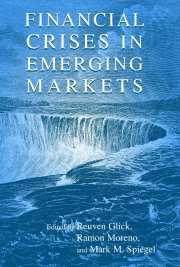Book contents
- Frontmatter
- Contents
- Preface
- Contributors
- 1 Financial Crises in Emerging Markets: An Introductory Overview
- PART I DETERMINANTS AND PROPAGATION OF FINANCIAL CRISES
- PART II CAPITAL FLOWS AND REVERSALS
- PART III INSTITUTIONAL FACTORS AND FINANCIAL STRUCTURE
- 8 Excessive FDI Flows under Asymmetric Information
- Discussion
- 9 Corporate Growth and Risk around the World
- Discussion
- PART IV POLICY RESPONSES
- Index
Discussion
Published online by Cambridge University Press: 04 August 2010
- Frontmatter
- Contents
- Preface
- Contributors
- 1 Financial Crises in Emerging Markets: An Introductory Overview
- PART I DETERMINANTS AND PROPAGATION OF FINANCIAL CRISES
- PART II CAPITAL FLOWS AND REVERSALS
- PART III INSTITUTIONAL FACTORS AND FINANCIAL STRUCTURE
- 8 Excessive FDI Flows under Asymmetric Information
- Discussion
- 9 Corporate Growth and Risk around the World
- Discussion
- PART IV POLICY RESPONSES
- Index
Summary
The conventional wisdom holds that foreign direct investment (FDI) flows are less volatile, and therefore less dangerous, than short-term portfolio debt flows, especially for emerging markets. Econometrically detectable positive linkages to domestic investment seem clearest for FDI inflows. As a result, countries often woo foreign direct investors.
This analysis of Razin, Sadka, and Yuen turns the conventional wisdom on its head. It argues that under asymmetric information, FDI inflows can be excessive and produce multiple equilibria.
An important paper by Gordon and Bovenberg (1996) provides background for this one. In that paper, the setup is as follows:
Domestic residents invest within their home country.
They see a signal ε of productivity that is invisible to foreign equity investors.
The domestic investors sell to foreigners, at an endogenous price, those of their investments for which e is low enough that the return from selling, and buying a riskless domestic asset, exceeds the return from retaining the project.
The result is a “lemons” problem; and because foreigners know about the adverse selection problem in equity sales, equity prices depends on the conditional expectation E(ε ∣ ε ≤ ε∗), where ε∗ is the cutoff productivity signal below which domestic residents wish to unload their investments onto foreign direct investors.
A key question in the Gordon–Bovenberg setup is, Why is there any equity trade at all? Why doesn't the home equity market simply collapse, as in Akerlof's basic lemons model?
- Type
- Chapter
- Information
- Financial Crises in Emerging Markets , pp. 302 - 304Publisher: Cambridge University PressPrint publication year: 2001



